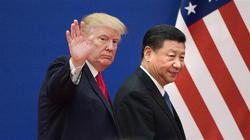 US President Donald Trump starts the new Christian year facing difficult foreign policy challenges while also dealing with a likely impeachment trial in the Senate and the responsibilities of his 2020 reelection campaign.
US President Donald Trump starts the new Christian year facing difficult foreign policy challenges while also dealing with a likely impeachment trial in the Senate and the responsibilities of his 2020 reelection campaign. RNA - The US military is still engaged in America’s longest war in Afghanistan, while North Korea continues to pursue nuclear weapons, and tensions with Iran are simmering following Trump’s withdrawal from the international nuclear deal with Tehran, The Associated Press said in an analysis.
Add to that the nearly two-year trade war with China, ongoing tensions with Russia and Turkey over the US military intervention in Syria, and erratic ties with European and other longtime Western allies, the AP said in its report.
“Trump is not popular overseas, and being an impeached president who must simultaneously run for reelection could reduce the time, focus and political clout needed to resolve complex global issues like North Korea’s nuclear provocations,” the report said.
“Some foreign powers could decide to just hold off on finalizing any deals until they know whether Trump will be reelected,” it added.
Trump, a self-proclaimed deal maker, is floundering as much internationally as he is domestically.
Trump himself has acknowledged the international challenges in a tweet on December 26.”It makes it much more difficult to deal with foreign leaders (and others) when I am having to constantly defend myself against the Do Nothing Democrats & their bogus Impeachment Scam. Bad for USA!”
For Trump, 2019 was also a disastrous year in foreign policy.
Last year was marked by conflicts large and small and the US constantly got rebuked by friends and foes alike. In his third year in office, Trump continued to add more failures and controversies to his foreign policy scoreboard. The following are the most glaring examples:
US-Iran tensions escalating
Tensions between Washington and Tehran have been rising ever since Trump in 2018 withdrew the US from the nuclear deal that Tehran had signed in 2015 with the US and five other nations.
For a year Iran stayed strictly committed to the nuclear deal, known as the JCPOA, after Washington violated its terms. But Tehran has scaled back its commitments, in four phases, as the European signatories failed to guarantee Iran’s interests out of fear of US sanctions.
Trump’s policy on Iran has been defined by military threats and economic sanctions. He adopted a hostile approach from day one. However, the so-called maximum pressure campaign has only backfired.
US still engaged in America’s longest war in Afghanistan
It’s no secret that Trump wants US engagement in Afghanistan to end, but critics have expressed concern about giving too many concessions to the Taliban or if they will honor any agreement that could end the fighting.
The US invaded Afghanistan in October 2001 and overthrew a Taliban regime in power at the time. But US forces have remained bogged down there through the presidencies of George W. Bush, Barack Obama, and now Donald Trump.
Some 18 years on, Washington is seeking a truce with the militants, who now control or have influence in about half of Afghanistan’s territories. The US wants any deal to include a promise from the Taliban that Afghanistan would not be used as a base by terrorist groups.
“We’ll see if they want to make a deal,” Trump told U.S. troops on Thanksgiving Day when he visited Afghanistan for the first time. “It’s got to be a real deal, but we’ll see. But they want to make a deal.”
847/940